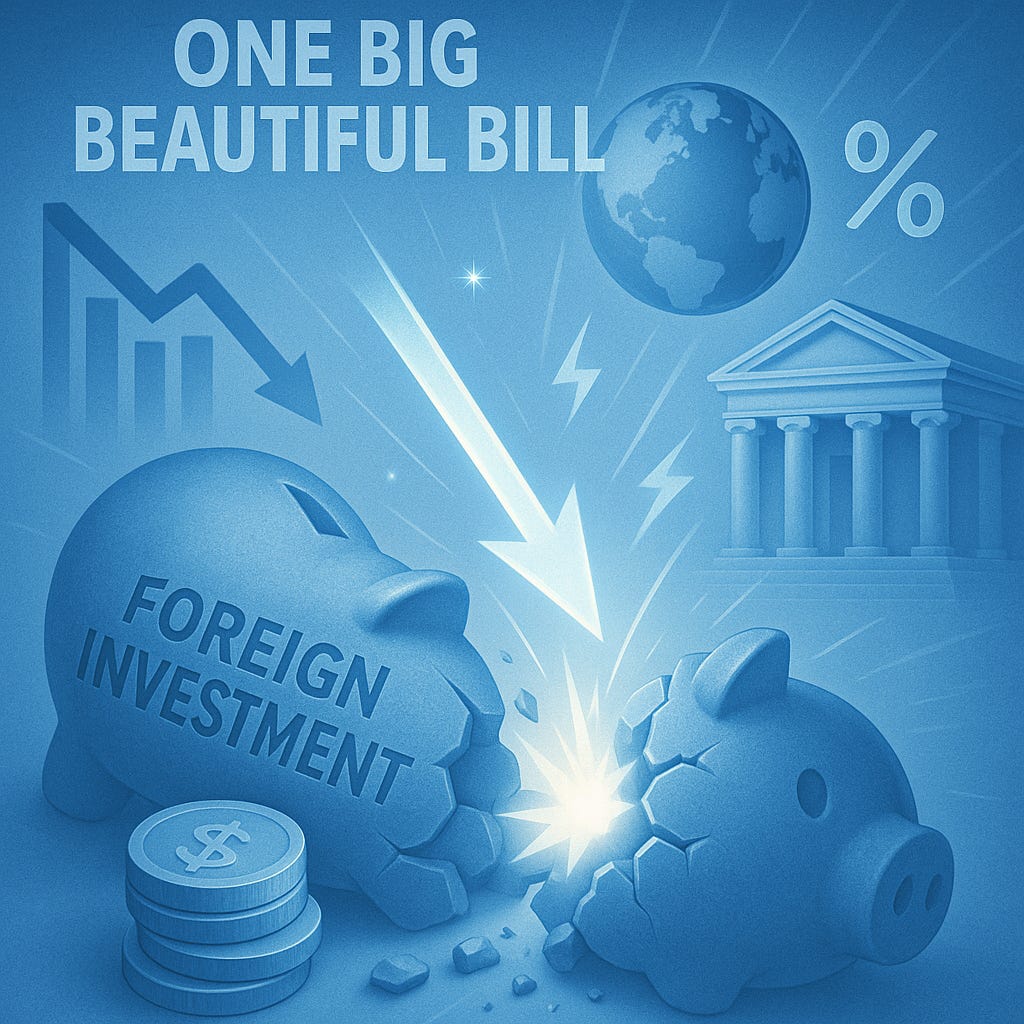Section 899 Undermines US Competitiveness
Section 899 of the Big Beautiful Bill wields tax law as a geopolitical weapon, instead of a means for economic growth
Section 899 of the House-passed “One Big Beautiful Bill” (OBBB) delivers a bold jab at foreign governments that impose what U.S. lawmakers deem “unfair” taxes on American firms. However, this provision is less an act of tax justice than a form of self-harm disguised as populist bravado.
As it stands, Section 899 is a retaliatory tax measure aimed at countries that enforce extraterritorial levies, such as the digital services tax (DST), the undertaxed profits rule (UTPR) from the Organisation for Economic Co-operation and Development (OECD), and “diverted profits taxes” (DPTs). The law would slap escalating surtaxes of 5% annually, up to 20%, on virtually all U.S.-sourced income earned by investors from these “offending” countries. It would also turbocharge the Base Erosion and Anti-Abuse Tax (BEAT), further burdening foreign multinationals operating stateside.
But while policymakers may intend to send a tough message to the OECD and tax-hungry European governments, Section 899 ultimately delivers the wrong message to the global economy: that the United States is willing to tax foreign investment out of spite, even at the expense of its own competitiveness.
Let’s be clear: The motivations behind Section 899 are not entirely misguided. The OECD’s attempt to cartelize global tax policy through its two-pillar scheme warrants firm opposition. Pillar One aims to redistribute profits from U.S. tech giants to consumption-heavy European nations. Pillar Two, worse still, mandates a global minimum corporate tax of 15%, threatening to abolish tax competition and to undermine fiscal sovereignty.
But Section 899’s cure may be worse than the disease. By imposing punitive taxes on foreign capital from countries that adopt OECD-aligned measures, the U.S. is effectively taxing foreign pension funds, sovereign wealth funds, and multinational corporations that invest in American productivity.
Alan Cole of the Tax Foundation put it best: “[It’s] like tossing a grenade at your stuff while it’s inside our house.” Indeed, according to Congress’s Joint Committee on Taxation, Section 899 is so economically self-defeating that it falls on the wrong side of the Laffer Curve, raising tax rates while reducing revenue by scaring off investors and depressing asset prices by the 2030s.
The reach of Section 899 is immense. Countries with the “unfair taxes” targeted under this law account for roughly 80% of all inbound foreign direct investment into the United States. We’re not talking about rogue states or tax havens — we’re talking about allies such as France, Germany, the U.K., and Canada. These are nations whose firms and institutions underwrite much of the capital that fuels American factories, finances innovation, and builds infrastructure.
Section 899 would impose higher taxes on everything from dividends and royalties to capital gains and business income. Even though portfolio interest from U.S. Treasuries is carved out, the sheer breadth of the provision ensures that much of the global investment community will be caught in its net.
And don’t be fooled into thinking this is just about collecting revenue. If it were, lawmakers wouldn't be relying on the Joint Committee on Taxation’s $116 billion revenue forecast over the next decade to meet budget scoring needs. That figure is misleading. If these taxes succeed in discouraging investment, as they’re designed to do, revenues will fall short, and America will be left poorer for the effort.
A broader danger lurks beneath Section 899: the slow drift toward capital controls. Combine this with the bill’s 3.5% remittance tax, and a pattern begins to emerge — one that uses tax policy as a bludgeon rather than a magnet for growth.
Tan Kai Xian of Gavekal warns that Section 899 could be perceived as a form of inbound capital control, while the remittance tax resembles a mini outbound control. It’s the economic logic of protectionism applied to capital markets — a dangerous turn for a nation long celebrated for its openness.
There is a valid case for pushing back against the OECD’s overreach. As I’ve argued elsewhere, the global tax cartel being promoted from Paris and Brussels is not about fairness. It’s about subsidizing high-tax welfare states by looting America’s productive economy.
But instead of mirroring their coercive tactics, we should take the high road: withdraw from the OECD if necessary, cut off funding, and refuse to recognize its authority over U.S. tax policy. If the Biden administration foolishly empowered Brussels, then the Trump administration is right to push back. But it must do so with surgical precision, not economic self-sabotage.
Rather than taxing foreign investors out of the U.S., we should make it more attractive to park capital here by embracing tax competition, lowering barriers, and reclaiming fiscal sovereignty — without the collateral damage.
Section 899 is not a smart negotiating tool. It’s a blunt instrument — one that risks igniting a transatlantic tax war, reducing investment, and harming the very American workers and consumers it claims to protect.
The ultimate irony of Section 899 is that it mimics the very worst impulses of the OECD: wielding tax law as a geopolitical weapon rather than a tool for growth. If the U.S. wants to lead on global tax reform, it should do so by example, not by issuing veiled threats or punitive levies.
Free markets thrive on openness, competition, and clarity, not fear and retaliation. Let’s not turn the United States into a fortress of financial insecurity. Instead, let’s build an economy that attracts capital from every corner of the globe and governs its tax system by principle, not vengeance.


